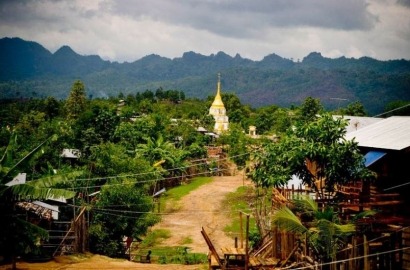
“Myanmar’s energy sector has suffered from decades of under-investment, and only one in four people currently have electricity access,” said Anthony Jude, Director of the Energy Division in ADB’s Southeast Asia Department.
“As Myanmar continues to open up there is a remarkable opportunity to utilize domestic energy resources to power the country’s development, but it’s essential that strong, enforceable environmental and social safeguards be firmly in place,” Jude said.
Myanmar’s per capita electricity consumption is amongst the lowest in Asia.
Approximately two-thirds of primary energy in Myanmar is supplied by biomass, such as fuel-wood, charcoal, agricultural residue and animal waste. Electrification rates range from 67 percent in Yangon to as little as 16 percent in rural areas.
While Myanmar has huge potential energy resources, their development has been hampered by limited capital; a lack of qualified personnel; poor legal and regulatory frameworks; and a lack of coordination and planning among seven energy-related ministries, the ADB said.
The assessment suggests that international investment in Myanmar’s energy sector could focus on medium- and long-term planning; rehabilitation works in power generation, transmission, and distribution; and the construction of a 500 kV transmission line, among other initiatives.
On a related note, Myanmar recently received an $850,000 technical assistance (TA) grant from the government of Norway to help update its 1984 Electricity Law so that it reflects current international standards, and creates the right conditions for establishing an electricity regulator, expanding rural electrification, and promoting off-grid solutions.
The loan was facilitated by the ADB, which is also acting as its administrator.
“The development and implementation of a National Electricity Law is the first step to meeting the country’s power needs,” said Stephen Groff, ADB Vice President of Operations in East Asia, Southeast Asia and the Pacific.
Formerly known as Burma, Myanmar has in recent years gone from being ruled by military leaders to a more democratic -- though still fragile -- form of government. As the Southeast Asian country's human rights record has improved, so has its standing in the world, prompting several western nations to remove longstanding economic sanctions.
As a result, the local population can now more readily buy household electrical appliances and local businesses are expanding rapidly. All of this has placed an enormous strain on the power supply network, which is often unreliable in urban centers and barely extends to Myanmar’s rural areas.
“Energy access for all is a priority for Norway. Without access to modern energy, there can be no development,” said Espen Barth Eide, Norway’s Minister of Foreign Affairs during a visit to Myanmar on 5 November.
“Having an updated Electricity Law, putting the proposed law into use, and conducting initial capacity building on principles of electricity regulation is essential for the development of Myanmar’s power sector, and an important contribution to the development of Myanmar’s economy and the welfare of its people,” Eide said.
The TA grant will support the drafting of energy legislation to gradually unbundle generation, transmission, and distribution subsectors; allow private sector participation in power generation; establish rules and regulations for small independent power producers to promote off-grid electrification; implement rural electrification programs; and establish an electricity regulator consistent with internationally-recognized best practices.
The grant will also be used to review various regulatory systems or laws applied to power sectors within and outside the region in order to formulate appropriate legislation that best suits Myanmar. Secondary legislation, and rules and regulations to implement various provisions of the Electricity Law, as well as create an Electricity Regulatory Authority, will be developed.
Drafting of the legislation and implementing rules and regulation will be carried out by the Ministry of Electric Power, in conjunction with other government departments, the private sector, civil society, parliamentarians, and development partners.
It is expected to take 18 months, with completion targeted for June 2014.
For additional information:

